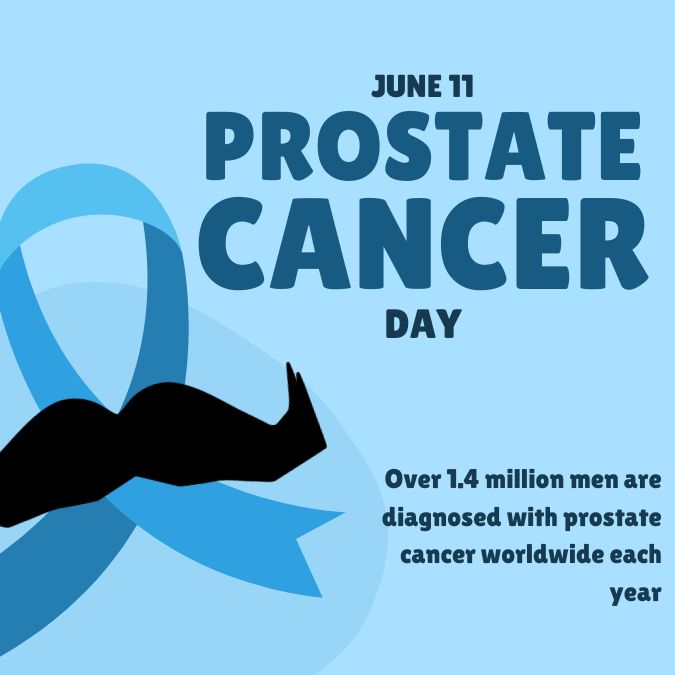11.06.2025
World Prostate Cancer Day
An opportunity to strengthen awareness

Every year, on 11 June, World Prostate Cancer Day is observed to raise public awareness about one of the most prevalent male neoplasms. This day fits within a European context increasingly focused on prevention and early diagnosis—fundamental pillars to improve treatment outcomes and reduce mortality.
On this occasion, EUCanScreen, the European project for innovation in cancer screening programmes, reaffirms its commitment to supporting European healthcare systems in adopting evidence-based strategies to enhance early detection, including for prostate cancer.
A growing cancer with significant disparities across Europe
Prostate cancer is currently the most commonly diagnosed carcinoma among men in Europe, with around 450,000 new cases each year and over 107,000 deaths recorded across the continent, according to data from the European Association of Urology (EAU) (https://epad.uroweb.org/). Despite its high incidence, the disease can progress asymptomatically for years, making timely intervention even more crucial.
Prostate cancer is now one of the leading causes of cancer-related morbidity in the male European population. According to the OECD–JRC 2025 report, incidence rates vary significantly between countries—from 104 cases per 100,000 inhabitants in Bulgaria to 265 in Lithuania. The EU average stands at 154 per 100,000, highlighting substantial differences related to the adoption of prevention and early diagnosis strategies (Full report PDF).
A new European recommendation on screening
For the first time, prostate cancer has been included in the European recommendations on cancer screening, revised in 2023 under the Europe’s Beating Cancer Plan. The new guideline recommends offering PSA (Prostate-Specific Antigen) testing, followed by multiparametric MRI in suspected cases, using a risk-stratified approach. The goal is to increase diagnostic precision and avoid unnecessary procedures, often caused by overdiagnosis (Source: European Parliament).
Numerous scientific studies, such as those from the European Randomized Study of Screening for Prostate Cancer (ERSPC) with 16-year follow-up, confirm that PSA screening can reduce prostate cancer mortality by up to 20% in men aged 55 to 69. The number of men needing to be screened to prevent one death (NNS) decreased to 570, showing an improvement in effectiveness over time (PubMed, 2019).
Further analyses of ERSPC data have shown that, after 21 years of follow-up, PSA-based screening reduces the incidence of advanced prostate cancer stages, disease progression, and the need for intensive treatments, contributing to a reduction in prostate cancer-specific mortality (euoncology.europeanurology.com).
Additionally, a 2024 study found that, after correcting for contamination and compliance, PSA screening was associated with a 31% reduction in prostate cancer mortality. In specific subgroups, such as Gothenburg, biennial screening over 20 years led to a 56% reduction, while in Rotterdam the reduction was 51% (nature.com).
These findings reinforce the importance of PSA screening as an effective tool for reducing prostate cancer mortality, emphasising the need for well-structured and personalised screening programmes to maximise benefits and minimise potential harms.
Cancer diagnostics and artificial intelligence: the role of EUCAIM
The European Cancer Imaging Initiative (EUCAIM) is one of the technological pillars of the EU Cancer Plan. The federated platform enables the sharing and analysis of diagnostic images—including those related to prostate cancer—across Europe. Partners are developing artificial intelligence algorithms to increase diagnostic precision and reduce the invasiveness of investigations, with potential impacts also on follow-up management (More on EUCAIM).
Equity and early diagnosis: Europe’s commitment
World Prostate Cancer Day is not only an opportunity for public awareness but also a catalyst for political and scientific action. To ensure early diagnosis truly becomes accessible to all, continued investment is needed in innovation, data interoperability, and risk-based prevention strategies.
Projects like EUCanScreen are essential to bridge inequalities and make every screening programme a tangible opportunity for equitable, effective, and evidence-based public health.

Prostate Cancer Screening
Prostate cancer is the second most frequently diagnosed cancer among men worldwide and the leading cancer type among men in several European countries. According to the World Health Organization, over 1.4 million men are diagnosed annually, and more than 375,000 die as a result of the disease. The incidence of prostate cancer increases significantly with age, particularly in men over the age of 50. In Europe, the disease burden is substantial and expected to rise further as life expectancy continues to increase.
Early detection through screening plays a critical role in reducing mortality associated with prostate cancer. The disease often develops slowly and remains asymptomatic in its early stages, which can result in delayed diagnosis without proactive screening. Early identification allows for timely intervention, which can significantly improve both survival rates and quality of life. In cases where prostate cancer is diagnosed at a localized stage, the five-year survival rate exceeds 98%. However, if the cancer has metastasized, the survival rate drops sharply to approximately 30%. This contrast highlights the importance of early and accurate detection.
The primary screening tools for prostate cancer are the prostate-specific antigen (PSA) blood test and the digital rectal examination (DRE). The PSA test measures the level of PSA in the blood, which may be elevated in the presence of cancer. While the test is not without limitations—such as false positives and overdiagnosis—it remains a valuable component of early detection strategies when used in conjunction with clinical risk assessment, magnetic resonance imaging (MRI), and biopsy where appropriate.
In Greece, prostate cancer screening is currently opportunistic rather than organized. It is typically initiated by individual physicians or patients rather than being part of a national screening protocol. As a result, there are notable inconsistencies in awareness, access, and clinical outcomes. Although Greece possesses a relatively modern healthcare system, gaps remain in public education regarding prostate health. Furthermore, social stigma and reluctance to discuss men’s health issues often discourage timely medical consultation.
Several challenges currently hinder effective prostate cancer screening in Greece:
- – Absence of a coordinated national screening program
- – Limited public awareness, particularly in rural or underserved areas
- – Cultural stigma and reluctance to seek preventive care
- – Concerns about overdiagnosis, overtreatment, and related healthcare costs
- – Gaps in training and coordination among primary care providers
Addressing these barriers will require a comprehensive and multi-tiered strategy:
- – Public Education Initiatives – Launch nationwide campaigns to improve understanding of prostate cancer risks and the benefits of early detection.
- – Implementation of a National Screening Program – Develop structured, evidence-based guidelines for routine screening, beginning at age 50 or earlier for high-risk populations.
- – Enhanced Role for Primary Care – Integrate prostate health into standard primary care consultations for men over 50, ensuring consistent advice and referral pathways.
- – Risk-Based Screening Approaches – Adopt tools to stratify patients by risk, thereby minimizing unnecessary procedures and focusing resources on those most likely to benefit.
In conclusion, while prostate cancer may progress silently in its early stages, health systems do not have to remain passive. With appropriate policy implementation, public engagement, and clinical coordination, early detection can be significantly improved. Greece has the opportunity to lead regional efforts in Southeast Europe by adopting a scientifically informed, equitable, and sustainable approach to prostate cancer screening. Improving early diagnosis is not only a matter of statistics—it directly translates into lives saved.
Subscribe to our newsletter to get news and updates.
Subscribe to our newsletter to get news and updates.

The general objective of EUCanScreen is to assure sustainable implementation of high-quality screening for breast, cervical and colorectal cancers, as well as implementation of the recently recommended screening programs – for lung, prostate and gastric cancers. EUCanScreen will facilitate the reduction of cancer burden and achieving equity across the EU.
This project has received funding from the European Union’s EU4HEALTH Programme under the Grant Agreement no 101162959











